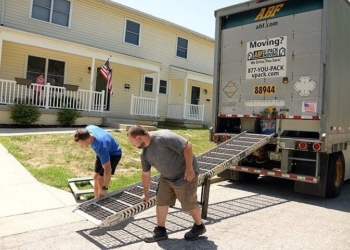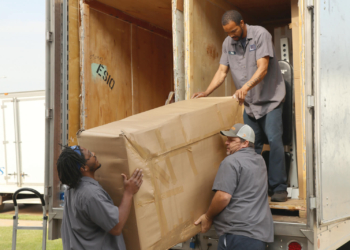Any Permanent Change of Station (PCS) comes with a variety of stresses and complications. One of the most important considerations for families is transferring insurance coverage from one residence to another.
Megan Harless, military spouse and founder of PCS Like A Pro, says having an insurance policy in place to cover personal belongings during a move is paramount.
“A lot of people think, surely if everything was damaged, they’ll pay for everything,” said Harless. “Unfortunately, that’s not true.”
While transportation service providers do have liability coverage, the maximum claim is $6 times the net weight of the household goods shipment, not to exceed $75,000. If you experience a catastrophic loss or extensive damage during your shipment, homeowners or renters insurance can cover the difference.
Homeowners insurance policies will often cover belongings for 30 days after your move, unless families specifically cancel their policy. Alternately, obtaining renters insurance for a new residence will serve the same purpose. If you are obtaining renters insurance, make sure it is in effect before you hand your household goods over to your transportation service provider.
The best way to ensure that everything stays covered is to talk to your insurance agent one-on-one, which should include asking how long your coverage will remain in effect after a move or when your renters policy begins. Any policy should explicitly cover belongings both in storage and in transit. To guarrantee that your household goods are always covered in full, don’t leave any gaps in the coverage.
Keep in mind that not every item or form of damage is included in standard policies. If your shipment arrives with mold, that will most likely be excluded, and any claims will need to be filed with your transportation service provider. Also, certain valuable items such as jewelry, guns, rugs and silver can be subject to sub-limits (an additional limitation on coverage), so their replacement value might not be covered in full without a supplemental policy.
Whether you are retaining a homeowners policy for the duration of the move or switching to renters insurance at your new duty station, the policy should include worldwide coverage. This will cover your personal property if it is damaged during transit.
PCSing can also involve major changes to your auto insurance coverage. Different states have different minimum coverage requirements. Rates will vary from state to state, so changing your primary residence can also be a hit to your household budget.
Call your current insurance provider to see if they offer coverage in your new state of residence. If you decide to shop around for competitive quotes, don’t wait until the last minute. Any lapse in coverage could increase your premiums.
Writing up an inventory of your belongings before the move will be the easiest way for any claim to proceed smoothly.
“People just think, ‘I can say it was $200,000 worth of stuff and I’ll get a check cut for that,’” Harless said. “That’s not necessarily the way that works. It feels like a very daunting and intimidating process, but when you’re in that moment of being stressed and emotionally drained from being notified you have that catastrophic loss, an inventory can help make the process easier.”
Timestamped videos and photos will also give you solid documentation that valuable items were intact before the move. Harless suggests standing in the center of a room with a camera and turning 30 degrees at a time, snapping pictures.
“We go through all of this work in hopes we never need to utilize it,” she said. “Prepare for the worst, hope for the best.”
Read comments










































